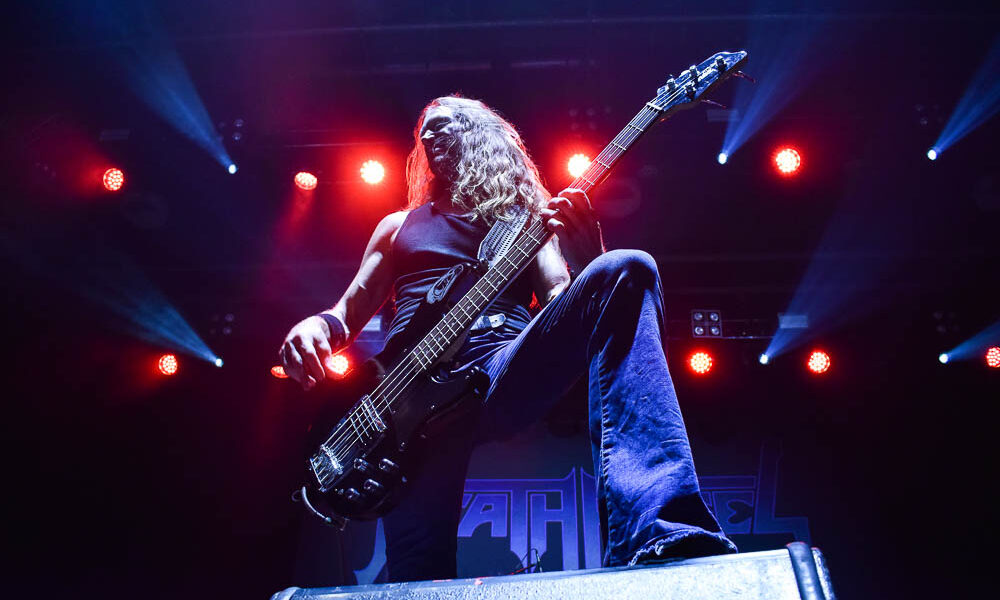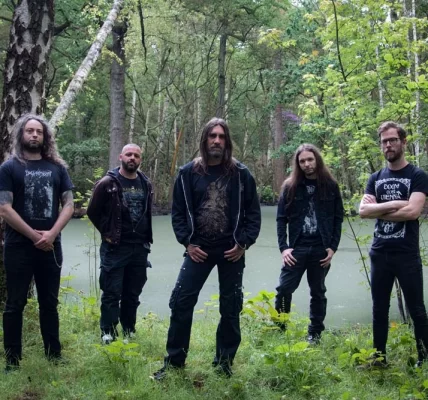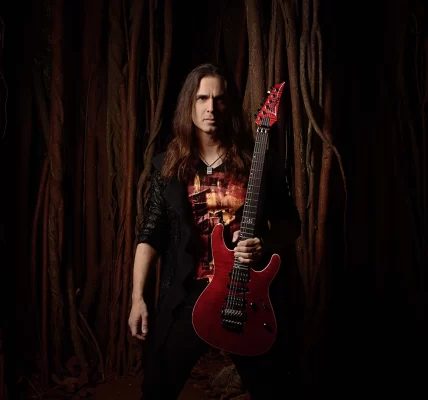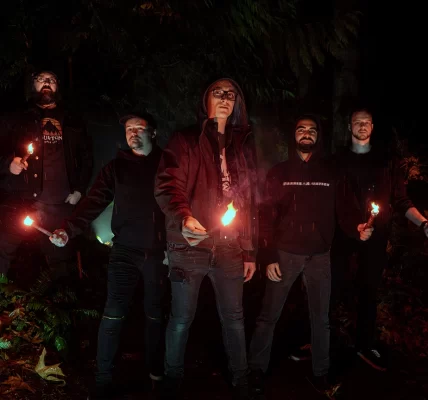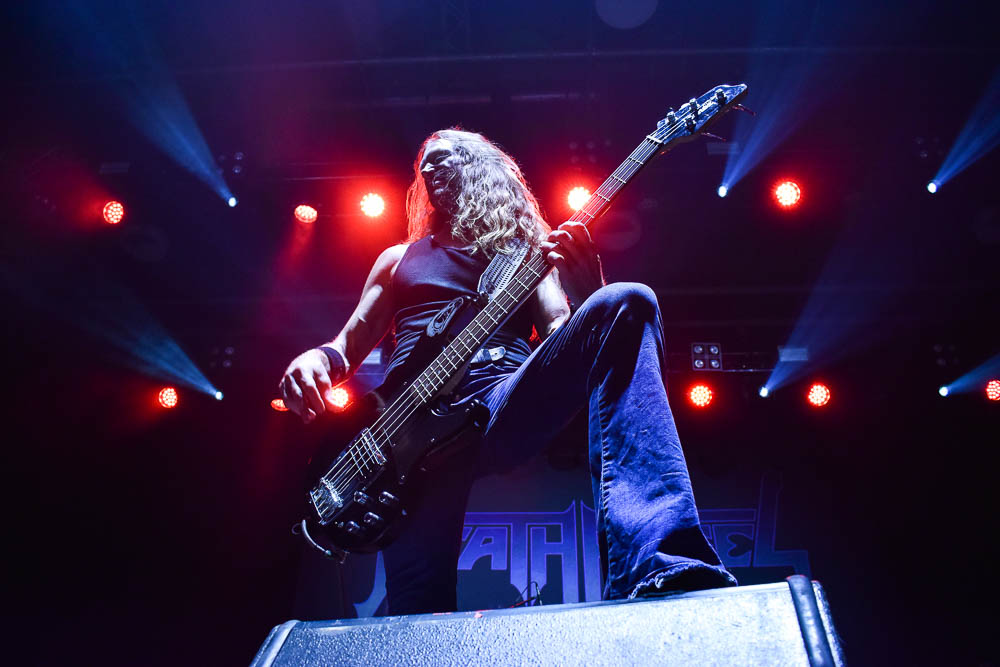

One of the most philosophical artists I’ve ever met, Damien Sisson of Death Angel can turn a conversation into a real renaissance moment. He moves fast—and has now shared the stage with some of the biggest names in metal, including Metallica and Kreator.
He grew up in northern California, with a love for nature and an organic sensibility. Knowing how hard it is to sustain health and energy while touring long, busy nights, one of the first things I wanted to learn was how he kept his health intact on the road.
Damien: I’ve held the mindset that the habits you form on the first days of tour establish the patterns you will carry throughout the rest of tour. Because of this, starting off “on a good foot” is essential to my own positive well-being. One thing I try to stay aware of is that while on tour, I’m a professional musician. I need to hold myself to a standard of conduct that allows me to achieve the best possible performance on a nightly basis for the duration of it. Anything less than my best night after night isn’t cheating my boss, or some employer; its cheating the people who’ve set aside their time and money to support the band and the music. The audience deserves our best performance every time we take the stage, and there is a responsibility to try and maintain professional integrity.
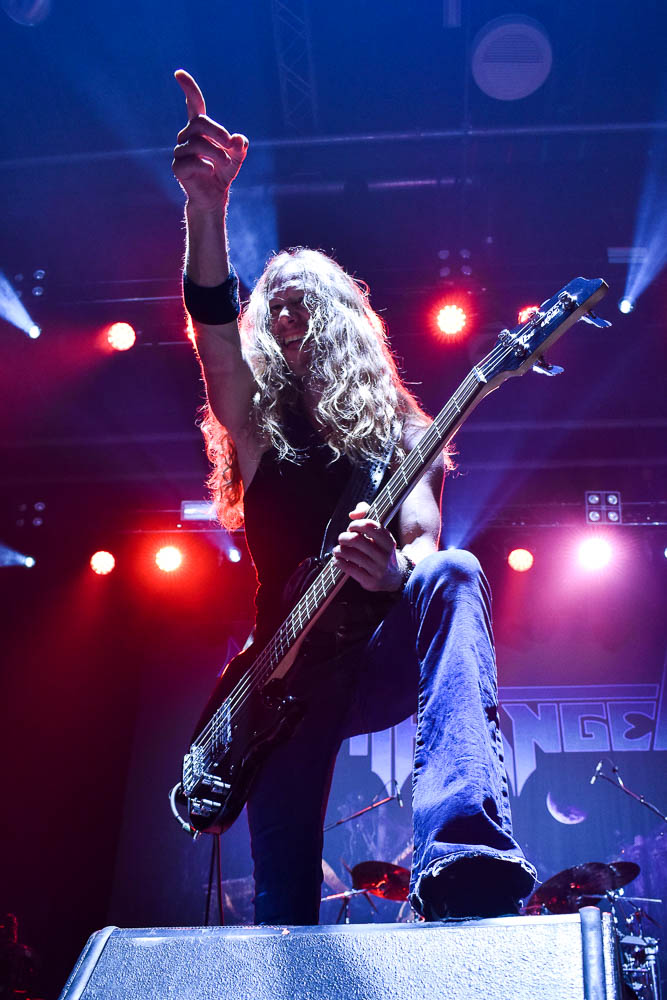

Being on the road with 8-12 people on a bus daily for weeks at a time is challenging. When factoring in eating habits, exercise habits, alcohol, party favors, personal space (if it exists), attitudes can sour quick without some precaution. When there’s a problem interpersonally, that’s a problem for the whole bus and crew as we live together; and by extension, the local crew pick up on the tone set by the band and crew, and attitudes adjust to the vibe of the tour… and ultimately, it’s the fans who suffer by not getting the best possible performance from the band they came to see.
Eating is a factor in how we feel, how motivated we are, and the general tone of our mood. Exercise is a factor; it combats stress and elevates mood. I think when choosing to be a professional musician, one ought to commit themselves to the responsibility of being a public servant; we’re employed to entertain an audience, and there ought to be a sense of responsibility to uphold a diet and routine that’ll allow us to perform our best throughout the duration of the tour.
Your drive to play and make music is inspirational. How do you balance this with your family and important relationships in your life? Does your love of music ever transcend into family activities?
Balance in life alone is complicated. For committed musicians, it can be even more complicated as there isn’t a single prescribed method to “properly” navigate the act of balancing relationships, friends, family and music. But, compromise seems to be key. Unfortunately, sometimes music is percieved a threat to, or a “priority” above, a relationship. To me, these things can’t be compared; the love for music isn’t the kind of love you have for a romantic partner or family member; they can’t “compete” because they don’t occupy the same emotional space. So, it takes an exceptional partner to understand the challenges of being in a relationship with a professional musician and still be willing to share that burden of emotional maturity.
What I’ve found has helped steer me straight is my circle of people I can trust; people who I understand, but also who understand and trust me. Maintaining a “home base” or circle of friends and family, the people who know who I am away from the stage, who aren’t influenced by how being a performer can alter perceptions—these people are the foundation to keeping me level-headed and grounded. It’s by their support and understanding that I’m able to live the life I do. Maintaining gratitude for my people will always be a priority even if it means I can’t be there for every holiday, birthday, wedding or funeral; those people’s importance in my life can never be diminished and their willingness to compromise and encourage me has allowed me to live the life of a traveling, professional musician, so I can only allow myself to feel gratitude for my circle.
You are really moved by the music; you’ve been feeling groove and emotion through bass ever since high school. Bass notoriously follows drums. Tell me.. Do you ever find yourself getting “lost in the sensation”, and find yourself accenting a different instrument in the band?
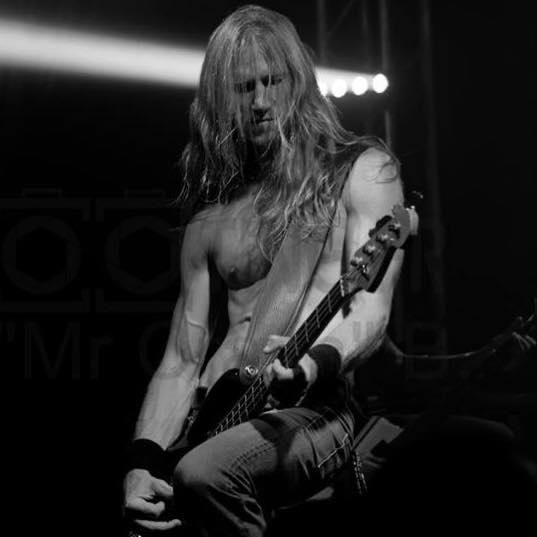

The bass guitar’s primary responsibility is rhythmic, and therefore maintaining syncopation with the percussion or drums is essential to keeping the momentum of the music. There is often difficulty in identifying the bass guitar in the mix, and in particular in rock and heavy metal, bass can seem less audible. Often times people “feel” the bass more than they “hear” the bass. It’s important to maintain steady playing and consistent sound, or feel. People may not consciously notice the bass until it’s gone, at which case the groove or “pocket” is missing from the sound—and so low-end consistency and smooth, controlled rhythm is important to keeping that momentum.
This question is great because yes, though the bass is primarily a rhythm instrument, and keeping a consistency is essential, music is also about expression and communication, sharing ideas. Sometimes the expectations need to be pushed in order for music to reach its maximum impact. The bass is another voice, used to express and communicate ideas, and at times it may be necessary for the bass to step outside its conventional role in order to allow for a piece of music to arrive at its destination. I find myself listening to the guitars and vocals or keyboards to see if there isn’t a melody or harmony I can interact with on those instruments. I find supporting and accentuating the other instruments or voice can offer nuance that benefits the dynamics of the song without drawing attention away from the musical themes and concepts. In my experience, the most important aspect in contributing to a piece of music isn’t necessarily bringing in new or fresh ideas, but listening to the other instruments and finding out how to make what they’re already doing sound better.
You’ve been inspired by a wide genre of musicians; from Black Sabbath to Michael Manring, funk to classical upright bass. Has there been any one person who’s had a little more influence on how your style has evolved?
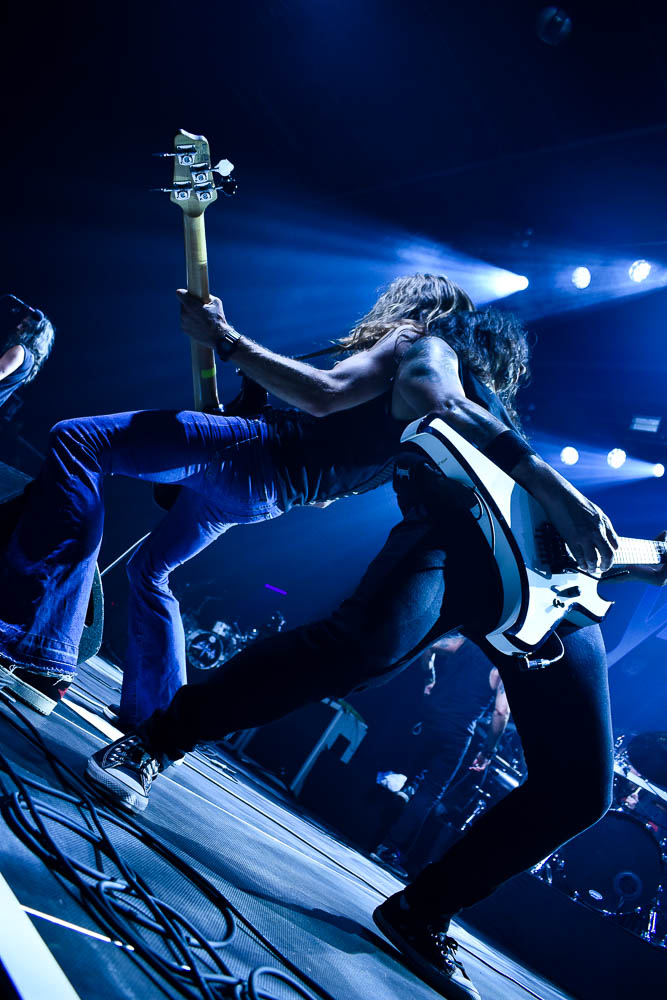

There are so many great artists and musicians that continue to inspire me to this day. But, when we talk about crucial influences, the people that probably changed the “course of the river”, I can’t give any more credit than to my bass teacher, Steve Hoffman. I say this not because guys like Victor Wooten, Billy Gould, Cliff Burton, or Geddy Lee didn’t have MASSIVE influence on my playing, because all of those guys have been pillars to my “temple of bass”. But I have to cite Steve Hoffman as my biggest inspiration, because so often I’ve heard the unfortunate stories of young aspiring musicians turned off by their teacher’s “lessons of command,” and Steve only encouraged me to grow. He was, and is, so perceptive and intuitive; he knew how to push me just enough to open my mind to other music and genres without turning me away from what got me into music in the first place. And I think his philosophy is valuable: “It’s not important to enjoy every style or genre of music, but it can be beneficial to know the fundamentals of other music and have the option and ability to incorporate them into my “musical vocabulary”.
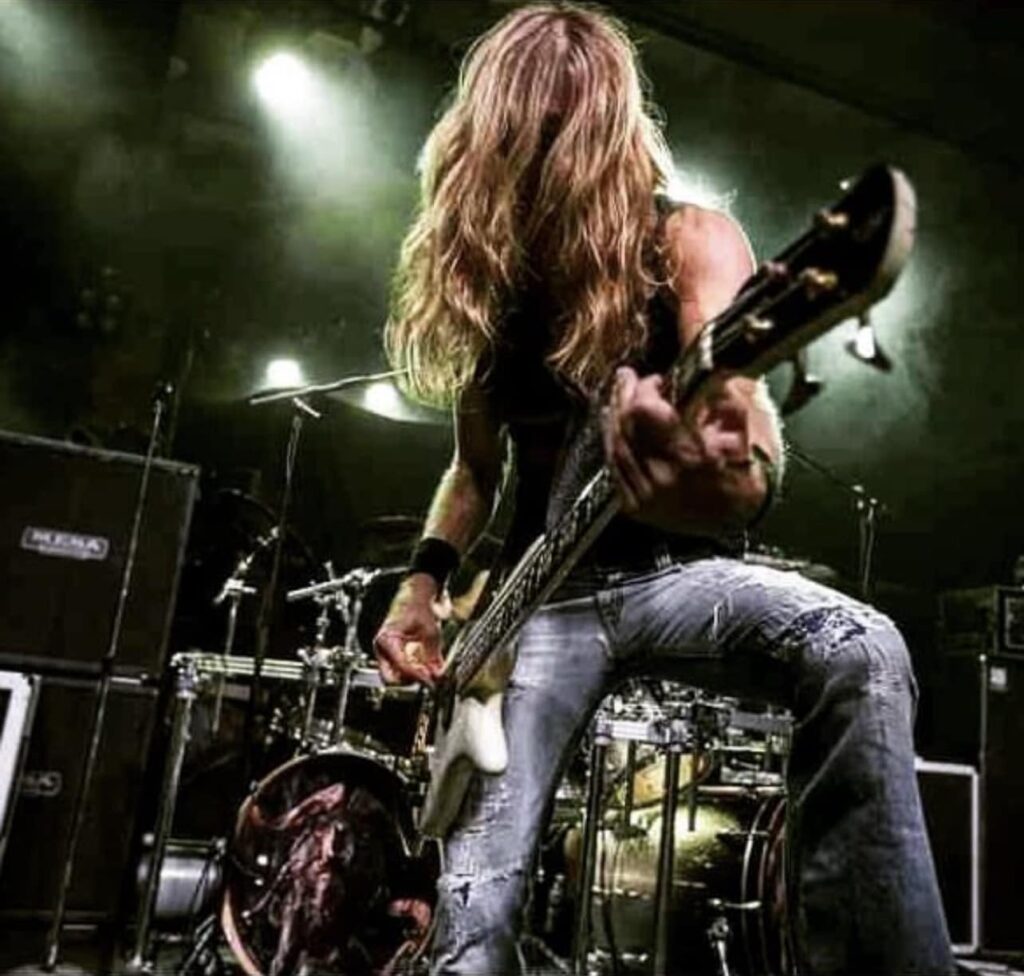

By encouraging me to understand how jazz works, or how classical is composed, or how slap ‘n pop bass interacts with the drums, Steve set me up to be adaptable, versatile and supportive; all of which have been instrumental in my career as a musician and a bass player. Having a good mentor, teacher, or role-model is beneficial at any stage of life if that person has something genuine to teach. Fortunately, we are never too old to learn something new or correct a bad habit. Being such, I try to seek people who can show me how to do something better, how to become more efficient, or are willing to help me correct me when I make mistakes. This goes beyond music.
Are you working on anything on your own?
I’ve been writing songs ever since I first picked up the bass, but have always landed myself in bands that were already established, or had a certain genre they were committed to. The thing about the music I’ve written is that I’ve never written under pressure, or with any objective. I’ve only written when inspiration struck, and I would follow through to see where it led me. Often, it’s as if the song writes itself and I’m just conscious of what the sound seems to be implying comes next.
I’ve also become a perfectionist—I know I can always improve a part, make a melody stronger, simplify a section—and then think I will never release anything and stay stuck lamenting on how it can always be “better.” Currently, I’ve about 50 songs at different levels of completion across genres, from demo to entering mixdowns. Eventually, I will open the flood gates and have massive amounts of releases that seemingly have no thematic connection to one-another, but in the meantime I’d rather work hard on having the music where I’d like it to be and let that do the talking. Rather than blow smoke up people’s Photography: Nick Decocco (https://www.instagram.com/nicholas_dicocco/) skirts talking about music that isn’t released yet, I have to trust that the right time will reveal itself and keep focusing on the music. The music will say more than any amount of selfpromoting can ever do, so I just have to wait, be patient, and trust that the instincts that got me this far in life will continue to take me further.
A tremendous thank you to Damien, as I always learn something new when I get a chance to talk to him. Death Angel is still on tour in Europe, and you can catch a show before it ends in December, with another show back in Santa Cruz, California. Here are the dates from Death Angel’s tour page:

